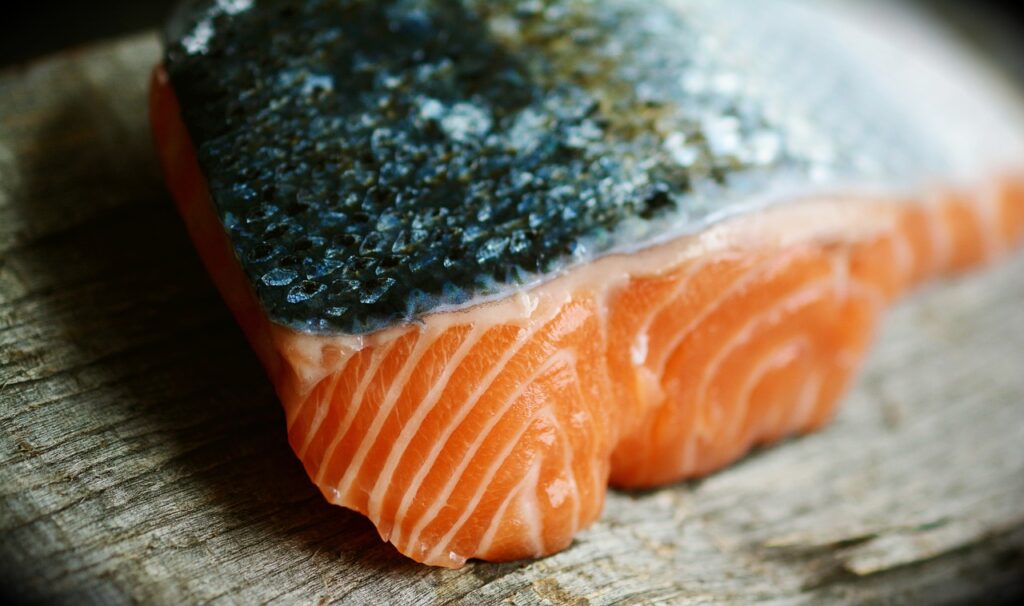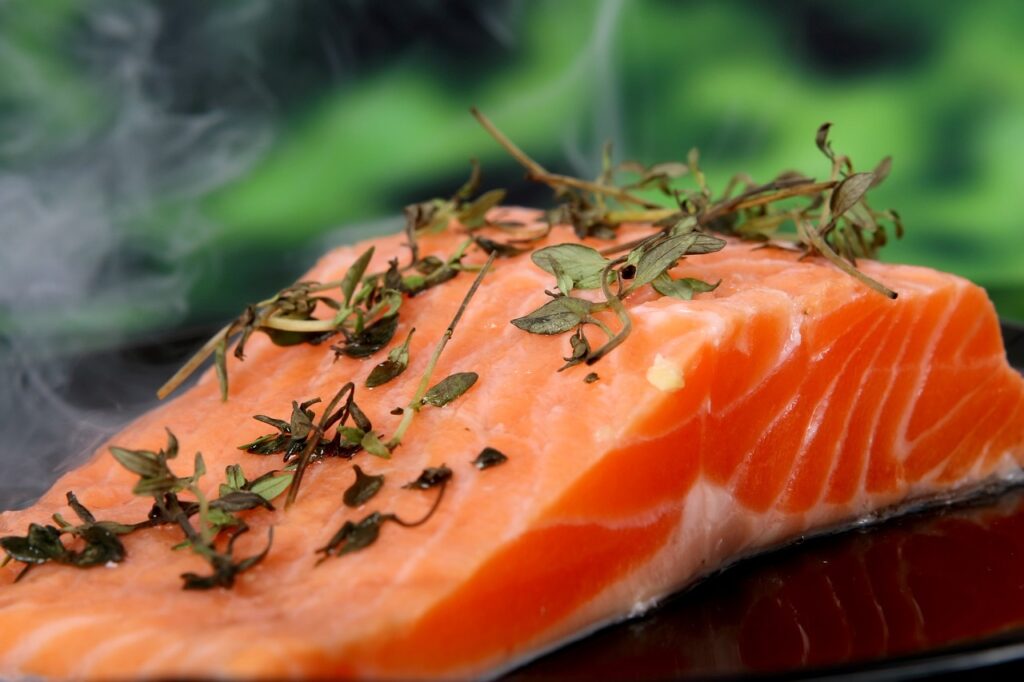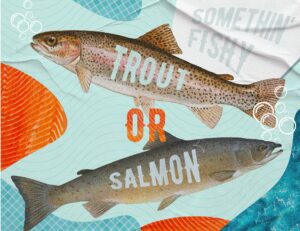Maintaining a healthy weight is a goal for many people, and the food we eat plays a significant role in achieving this goal. In weight management, making the right choices can be crucial, and one such choice is incorporating salmon into your diet.
Nutritional Benefits of Salmon
One of the main reasons salmon enjoys a strong reputation in the nutrition world is its high protein content. Protein is an essential macronutrient that not only helps maintain muscles but also plays a crucial role in weight management. Consuming protein-rich foods can increase satiety and reduce overall calorie intake, which is beneficial for weight loss and weight maintenance. Salmon provides a substantial amount of high-quality protein, making it an excellent choice for those looking to effectively control their weight. Additionally, salmon is known for its omega-3 fatty acids, especially eicosapentaenoic acid (EPA) and docosahexaenoic acid (DHA). These fatty acids offer various health benefits, but their relevance to weight management lies in their impact on inflammation and fat metabolism. Omega-3s help reduce inflammation in the body, which can be an obstacle to weight loss. Moreover, they support the body’s ability to break down and utilize fat for energy.

Salmon and Satiety
Satiety, which refers to the feeling of fullness and satisfaction after a meal, is a crucial component of successful weight management. Achieving satiety not only prevents overeating but also supports calorie control, making it an essential aspect of a balanced diet. Salmon is a nutrient-dense fish that plays a significant role in enhancing satiety and promoting weight management.
One of the standout features of salmon when it comes to promoting satiety is its high protein content. Protein is often referred to as a “satiety constant nutrient” because it triggers the release of hormones that signal fullness to the brain. When you consume protein-rich foods like salmon, you may experience greater satiety compared to diets lacking in protein. This is a valuable asset for those striving to maintain or lose weight.
Furthermore, the protein content in salmon is rich in essential amino acids, which are the building blocks of proteins. These amino acids are not only crucial for muscle maintenance and growth but also play a significant role in regulating appetite. When you incorporate salmon into your diet, it helps maintain lean muscle mass while promoting a feeling of fullness. This dual action is especially beneficial for those seeking to shed excess weight, as preserving muscle mass is crucial for a sustainable and healthy weight loss process.
Salmon vs. Red Meat
Comparing salmon to red meats like beef or pork reveals differences in salmon’s role as a source of lean protein. Salmon has several key advantages for weight management:
Lower Saturated Fat: Compared to many red meats, salmon has lower saturated fat content. Saturated fat is associated with an increased risk of heart disease, and reducing its intake is an important aspect of weight management. Salmon’s lean meat profile makes it a heart-healthy choice.
Maintenance of Lean Muscle: Protein is not only crucial for weight management but also for maintaining lean muscle mass. Salmon provides high-quality protein rich in essential amino acids required for muscle repair and growth. This is especially important for individuals who want to lose excess weight while preserving muscle tissue.
Omega-3 Fatty Acids: Salmon brings additional nutritional value to the table in the form of omega-3 fatty acids, primarily EPA and DHA. These healthy fats support cardiovascular health, reduce inflammation, and improve fat metabolism. Omega-3s promote effective weight management by enhancing overall health.
In addition to its protein content, the nutritional density of salmon further enhances its satiety-inducing characteristics. Nutritional density refers to the concentration of essential nutrients, such as vitamins, minerals, and antioxidants, relative to the calorie content of a food. In the case of salmon, its nutritional profile is outstanding.
Salmon is rich in various vitamins and minerals, including vitamin D, B vitamins (especially B12 and niacin), and selenium. These nutrients are not only crucial for overall health but also contribute to maintaining a balanced appetite. For example, vitamin D is known to regulate hunger and appetite, while B vitamins play a role in energy metabolism, influencing hunger.
Moreover, selenium is a potent antioxidant that helps combat oxidative stress, which can affect how your body responds to hunger and fullness signals. Consuming nutrient-dense foods like salmon ensures that your body receives the necessary nutrients, reducing the likelihood of craving extra food to meet nutritional needs.
The combination of protein and nutritional density makes salmon a satisfying food that can help curb appetite, thereby controlling calorie intake. This effect is particularly important for individuals who tend to snack or engage in emotional eating, as it can reduce the desire to consume excessive calories between meals.
To fully benefit from the satiety-inducing properties of salmon, consider incorporating it into your daily diet. Whether you prefer grilled, baked, or poached salmon, there are multiple ways to enjoy this delicious and nutrient-rich fish.

The Impact of Salmon on Metabolism
Metabolism is a series of complex chemical reactions that occur within the body to sustain life and is a key factor in weight management. A well-functioning metabolism ensures the efficient utilization of calories, which is crucial for both weight loss and weight maintenance. Salmon is often referred to as a superfood and has a positive impact on metabolism through various mechanisms, making it a valuable asset on your journey to a healthier weight.
Salmon’s impact on metabolism begins with what’s known as the thermic effect of food (TEF). TEF represents the energy expenditure associated with the digestion, absorption, and utilization of nutrients from the food you eat. Different macronutrients have different TEF values, and protein is one of the highest.
Salmon is rich in protein, and it requires more energy to digest compared to foods with lower protein content. This means that by incorporating salmon into your diet, you can effectively and gently boost your metabolism. Your body expends extra energy to break down the protein in salmon, which, in turn, increases overall calorie expenditure.
Increasing TEF with protein-rich foods like salmon helps control calories. It assists in regulating calorie intake and may create a calorie deficit, which is a fundamental principle in weight loss. When your calorie intake is less than the calories you burn, your body uses its stored energy, primarily fat, as fuel, resulting in weight loss.
The metabolic benefits of salmon are not limited to weight loss but also extend to weight maintenance. While shedding excess weight is a common goal, long-term weight maintenance is equally important for overall health. Here’s how salmon plays a dual role in weight management in these two phases:
Weight Loss: As mentioned earlier, the protein content in salmon and its associated TEF support weight loss by curbing hunger and increasing calorie expenditure. When you’re on a weight loss journey, incorporating salmon into your diet can help you feel full while consuming fewer calories, making it easier to adhere to a calorie control plan.
Weight Maintenance: After reaching your target weight, maintaining it requires a stable balance between the calories consumed and burned. The metabolic advantages of salmon remain valuable. By including salmon in your diet, you can help maintain a healthy metabolism, preventing the common metabolic slowdown that often occurs after weight loss. This is crucial for avoiding weight regain and preserving the results you’ve worked hard to achieve.
Incorporating salmon into your weight management plan is akin to boosting your metabolism. It not only promotes weight loss by encouraging calorie control but also helps maintain a healthy weight by keeping your metabolism active and efficient.
It’s worth noting that while salmon has metabolic benefits, overall dietary choices and physical activity are essential components of effective weight management. A balanced diet, regular exercise, and an overall healthy lifestyle contribute to successful and sustainable achievement of a healthier weight.

The Benefits of Salmon for Heart Health
A healthy heart is not only a critical component of overall health but also plays a vital role in the success of your weight management journey. Salmon is a nutrient-rich fish with significant cardiovascular benefits and is a key component when prioritizing heart health and working towards a healthier weight.
Maintaining cardiovascular health is an integral part of effective weight management. An unhealthy heart can limit your ability to engage in physical activity, which is crucial for burning calories and maintaining a healthy weight. Salmon’s contributions to heart health are particularly beneficial in this regard.
Salmon is known for its high content of omega-3 fatty acids, especially eicosapentaenoic acid (EPA) and docosahexaenoic acid (DHA). These omega-3 fatty acids have been extensively studied and are associated with a range of cardiovascular benefits. They help reduce the risk of heart disease by decreasing inflammation, improving blood vessel function, and lowering blood pressure. By supporting overall heart health, salmon ensures you are better equipped to engage in regular exercise, which is a key aspect of weight management.
Salmon also contributes to reducing inflammation. Inflammation, whether chronic or acute, can be a significant barrier to weight loss. It can disrupt the body’s ability to regulate blood sugar levels and effectively store fat, hindering your weight management efforts. Omega-3s in salmon have potent anti-inflammatory properties, making it an ideal food choice for alleviating this obstacle.
Chronic inflammation is a common factor in diseases like obesity, diabetes, and heart disease. Omega-3s from salmon help reduce inflammation in the body, creating a more favorable internal environment for weight management. By lowering levels of inflammation markers like C-reactive protein (CRP) and interleukin-6, salmon can assist in weight loss and maintaining a healthy weight.
Incorporating salmon into your diet is not just about calories; it’s about your broader health. The omega-3 fatty acids in salmon have anti-inflammatory effects, supporting heart health and more effective weight management.
To make the most of the cardiovascular benefits of salmon, it’s essential to include this fish as part of a heart-healthy diet. Consider the following tips:
Regular Consumption: Aim to eat salmon at least twice a week. This frequency allows you to benefit from its omega-3 content and continuously support your heart health.
Preparation Methods: Choose healthy preparation methods, such as grilling, baking, or broiling, to preserve the nutritional integrity of salmon. Avoid frying, as it adds unnecessary calories and unhealthy fats.
Balanced Diet: Combine salmon with a variety of vegetables and whole grains to create a comprehensive, heart-healthy diet. A diet rich in fruits, vegetables, and whole grains provides essential nutrients that further support cardiovascular health and weight management.
Supplements: In some cases, individuals may choose omega-3 supplements, especially if they don’t consume fish regularly. Consult a healthcare provider to determine the best approach for your individual needs.
Salmon and Portion Control
Portion control is a fundamental aspect of effective weight management. It ensures that you consume an appropriate number of calories, prevents overindulgence, and helps you maintain a healthy weight. Salmon, with its natural portion sizes and numerous health benefits, is an ideal choice for those looking to regulate calorie intake and make wiser dietary decisions.
One of the notable features of salmon is its naturally portioned size. A typical salmon fillet is around 3 to 6 ounces, which aligns well with standard recommendations for protein portion sizes. This inherent portion control minimizes the need for extensive measurements and calorie calculations, making it easier for individuals to maintain a balanced diet.
Salmon’s high protein content further enhances its portion control advantage. Protein-rich foods have a satisfying effect on hunger, meaning that after consuming an appropriate portion of salmon, you may feel full and satisfied. This natural satiety can reduce temptations for overeating or indulging in high-calorie foods.
Controlling portions with salmon is especially valuable for those who tend to overeat or have difficulty managing portion sizes. By choosing salmon as a staple in your diet, you can easily regulate calorie intake and develop a healthier relationship with food.
Incorporating salmon into your diet isn’t just about portion control; it also involves variety and flavor. With countless delicious and nutrition-rich salmon recipes, you can create a balanced diet that caters to your taste preferences while staying committed to your weight management goals.
Risks and Precautions

While salmon offers many health benefits and is an excellent choice for weight management, it’s essential to understand potential risks and precautions.
One of the primary concerns when consuming seafood, including salmon, is the potential mercury content. Mercury is a naturally occurring heavy metal in the environment that can accumulate in fish, especially larger species like sharks, swordfish, and certain types of tuna.
The good news is that salmon typically has low mercury content, making it a safe choice for most people, including pregnant women and children. However, it’s still advisable to be mindful of overall fish intake, especially when consuming a variety of seafood. The U.S. Food and Drug Administration (FDA) and the Environmental Protection Agency (EPA) provide guidelines for safe fish consumption, including specific recommendations for pregnant women and young children to minimize mercury exposure. These guidelines generally advise choosing fish with lower mercury content, like salmon, while avoiding fish with higher mercury content.
Additionally, salmon is a common allergen, and some people may experience allergic reactions when consuming salmon. Allergic reactions to salmon can range from mild to severe, including symptoms like rashes, hives, itching, swelling, and, in more severe cases, difficulties in breathing or anaphylactic reactions. If you suspect or know that you are allergic to salmon, it’s crucial to avoid consuming salmon and any salmon-derived products.
Dietary restrictions and preferences can affect your ability to incorporate salmon into your diet. For example, individuals following vegetarian or vegan diets may choose to avoid all animal products, including fish. If you have specific dietary restrictions, you’ll need to explore alternative sources of lean protein and omega-3 fatty acids to support your weight management goals.
Another aspect to consider when consuming salmon is sustainability. Overfishing and unsustainable fishing practices can deplete fish populations and harm the environment. When purchasing salmon, especially wild-caught salmon, look for certifications and labels from organizations like the Marine Stewardship Council (MSC) that certify sustainable seafood. By choosing sustainably sourced salmon, you’re not only making an environmentally responsible choice but also ensuring that future generations have access to this nutrient-rich fish.
Lastly, while the omega-3 fatty acids in salmon offer many health benefits, maintaining a balance in your overall omega-3 intake is essential. Excessive consumption of omega-3s, especially through supplements, can have potential side effects, such as bleeding disorders or interactions with certain medications.
To avoid overconsumption of omega-3s, it’s important to incorporate salmon into your diet in moderation and consider consulting a healthcare professional or registered dietitian. They can provide personalized guidance on your omega-3 intake based on your specific health needs and dietary habits.
Conclusion
In summary, salmon is an outstanding ally on your weight management journey. Its protein content, omega-3 fatty acids, and various health benefits can help you achieve your weight loss and weight maintenance goals. Whether you’re looking to shed excess weight, maintain a healthy weight, or improve overall health, salmon is the perfect choice to make you healthier. So, why wait? Embrace the salmon solution, making it a regular part of your balanced diet for long-term weight management success.
Frequently Asked Questions
Q1: Can I eat salmon every day for weight control?
A1: While salmon is a nutritious choice, it’s recommended to vary your sources of protein for a balanced diet. You can eat salmon several times a week, but be sure to incorporate other lean protein sources and a variety of foods for comprehensive weight management.
Q2: Is canned salmon as healthy as fresh salmon?
A2: Canned salmon is a convenient and cost-effective choice. It retains most of the nutrients found in fresh salmon, including omega-3s. However, be mindful of the salt content in canned varieties and opt for low-sodium options whenever possible.
Q3: Can children eat salmon for weight control?
A3: Salmon can be part of a healthy diet for children as it provides essential nutrients. Consult a pediatrician or a registered dietitian for specific recommendations based on a child’s age and dietary needs.
Q4: How can I reduce the fishy taste of salmon?
A4: Marinating salmon with herbs, spices, and citrus can help reduce the fishy taste. Cooking methods like grilling and baking can enhance its flavor. Wild-caught salmon varieties typically have a milder taste compared to farm-raised ones.
Q5: Is it safe to consume raw salmon (sushi or sashimi) for weight control?
A5: While sushi and sashimi can be part of a balanced diet, there is a risk of foodborne illness when consuming raw seafood. Ensure you source sushi-grade salmon from reputable suppliers to minimize this risk.
Q6: Can people allergic to seafood find alternative sources of omega-3 for weight control?
A6: Yes, there are other sources of omega-3, such as flaxseeds, chia seeds, and walnuts, suitable for people allergic to seafood. Consult a healthcare professional or a dietitian for personalized recommendations.
Q7: How does salmon compare to other fish for weight management?
A7: Salmon is one of the top choices for weight management due to its high-quality protein content, omega-3 fatty acids, and low saturated fat. However, other fatty fish like mackerel, sardines, and trout offer similar benefits and can be included in weight management plans.














